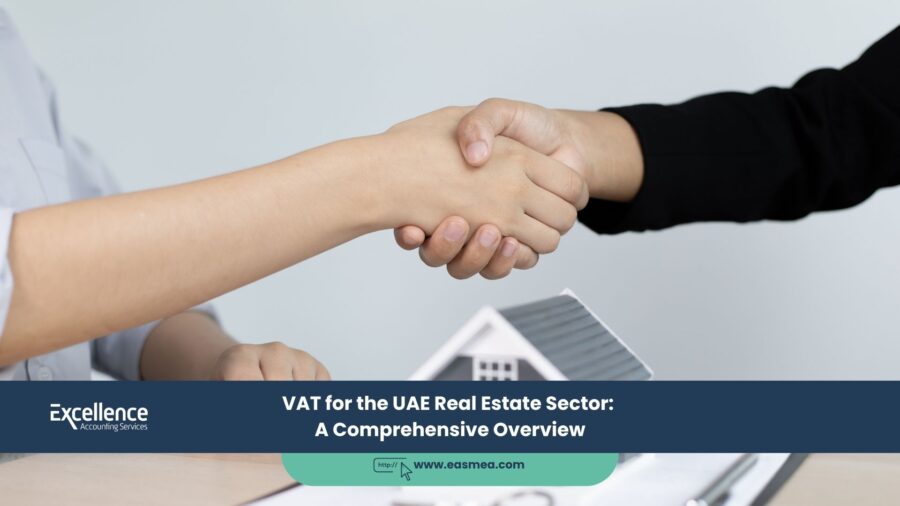VAT for the UAE Real Estate Sector: A Comprehensive Overview
The UAE’s real estate sector is a cornerstone of its economy, attracting significant investment from across the globe. With the introduction of Value Added Tax (VAT), a new layer of complexity was added to property transactions. Unlike many other sectors where a standard 5% rate applies across the board, the VAT treatment for real estate is highly nuanced. It varies dramatically based on the type of property—whether it’s commercial or residential—and the nature of the transaction, such as a first sale, a resale, or a lease.
- VAT for the UAE Real Estate Sector: A Comprehensive Overview
- The Fundamental Distinction: Commercial vs. Residential Property
- VAT Treatment of Real Estate Supplies: A Detailed Breakdown
- The Challenge of Input VAT Recovery
- Navigate Real Estate VAT with Confidence with EAS
- Frequently Asked Questions (FAQs)
- Don't Let VAT Complicate Your Property Deals.
For developers, investors, landlords, and tenants, a clear understanding of these rules is not just important; it’s essential for compliance, financial planning, and risk management. Misinterpreting the VAT law can lead to significant financial losses, from failing to charge VAT when required to incorrectly claiming back input tax, resulting in penalties from the Federal Tax Authority (FTA). Whether you are developing a new tower in Dubai, buying a family villa, or leasing office space, VAT is a critical factor in the transaction.
This guide provides a comprehensive overview of the VAT rules for the UAE real estate sector. We will break down the different classifications of property, explain the specific tax treatment for various transactions, and clarify the complex rules around input VAT recovery. This will serve as an essential resource for navigating the financial landscape of UAE property with confidence and clarity.
Key Takeaways
- Commercial vs. Residential is Key: The VAT treatment depends entirely on whether a property is classified as commercial or residential.
- Commercial Property: The sale and lease of commercial property are subject to the standard 5% VAT rate.
- First Sale of Residential Property: The first supply of a new residential building within three years of its completion is zero-rated.
- Subsequent Sales/Leases of Residential Property: The subsequent sale or lease of a residential property is exempt from VAT.
- Input VAT Recovery: Businesses can recover input VAT on costs related to making taxable supplies (commercial property). Recovery on costs for exempt supplies (residential leases) is generally not allowed.
- Mixed-Use Developments: Developers of mixed-use buildings must carefully apportion their input VAT between the taxable commercial part and the exempt/zero-rated residential part. Professional VAT consultants are vital here.
The Fundamental Distinction: Commercial vs. Residential Property
The first step in any real estate VAT analysis is to correctly classify the property. The FTA defines these terms specifically for tax purposes.
- Residential Property: A building intended and designed for human occupation. This includes villas, apartments, and townhouses. It does *not* include hotels, serviced apartments, or any place that is not a person’s principal place of residence.
- Commercial Property: Any real estate that is not a residential property. This includes offices, retail shops, warehouses, hotels, serviced apartments, and plots of bare land.
VAT Treatment of Real Estate Supplies: A Detailed Breakdown
Once the property is classified, the VAT treatment depends on the type of supply. The rules are summarized below.
1. Commercial Property Transactions
The rules for commercial property are straightforward:
- Sale of Commercial Property: Subject to 5% VAT.
- Lease of Commercial Property: Subject to 5% VAT.
This means if you sell an office or lease a retail shop, you must charge the buyer or tenant 5% VAT on the sale price or rent and remit this to the FTA.
2. Residential Property Transactions
The rules for residential property are more complex and depend on whether it’s a first supply or a subsequent supply.
- First Supply of a New Residential Building: This is zero-rated. A “first supply” is defined as the first sale or lease of a building by the developer within three years of its completion. The zero-rating allows the developer to recover all the input VAT they incurred on construction costs, preventing the tax from becoming a burden on new homebuyers.
- Subsequent Supply of a Residential Building: Any sale or lease after the first supply is exempt from VAT. This means if you sell your family villa to another individual or lease out your apartment, no VAT is charged.
3. Bare Land
Plots of bare land are treated as commercial property. Therefore, the sale or lease of bare land is subject to 5% VAT.
| Property Type | Type of Supply | VAT Treatment |
|---|---|---|
| Commercial Property (Office, Shop, Hotel, etc.) | Sale | Standard-Rated (5%) |
| Lease | Standard-Rated (5%) | |
| Residential Property (Villa, Apartment) | First Sale/Lease (within 3 years of completion) | Zero-Rated (0%) |
| Subsequent Sale/Lease | Exempt | |
| Bare Land | Sale or Lease | Standard-Rated (5%) |
The Challenge of Input VAT Recovery
The ability to recover the VAT paid on your business expenses (input tax) is directly linked to the type of supplies you make.
- Making Taxable Supplies (Standard-Rated or Zero-Rated): If you sell commercial property or make the first sale of a residential building, you can recover the input VAT on all related costs (e.g., construction materials, professional fees).
- Making Exempt Supplies: If you make exempt supplies (e.g., leasing out a residential apartment), you cannot recover the input VAT on related costs. That VAT becomes a real cost to your business.
The Mixed-Use Development Dilemma
This creates a major challenge for developers of mixed-use buildings (e.g., a tower with retail shops on the ground floor and residential apartments above). The developer is making both taxable supplies (the commercial units) and exempt/zero-rated supplies (the residential units). In this case, they must use a fair and reasonable method to apportion their input VAT, recovering only the portion related to the taxable supplies. This apportionment calculation is complex and a major area of focus during FTA audits. A mistake here can lead to significant penalties, making professional VAT return filing and advisory services essential.
Navigate Real Estate VAT with Confidence with EAS
The complexities of VAT in the UAE real estate sector require specialized knowledge and careful planning. Excellence Accounting Services (EAS) provides expert tax advisory to developers, investors, and property management companies.
Our Real Estate VAT Services:
- VAT Advisory for Property Transactions: We provide clear guidance on the correct VAT treatment for your specific sale, purchase, or lease transaction.
- Developer and Contractor Support: We assist developers with the complex calculations for input tax apportionment on mixed-use projects and help contractors manage their VAT obligations.
- VAT Compliance and Filing: We manage your bookkeeping and ensure your VAT returns are prepared accurately, reflecting the correct treatment of all property-related transactions.
- FTA Audit Assistance: In the event of an audit, our team can represent you and provide the necessary documentation and support to ensure a smooth process.
Frequently Asked Questions (FAQs)
The first supply is the very first time a new residential building is sold or leased by the developer. This supply must occur within three years of the building’s completion date to qualify for the zero rate. Any sale or lease after that initial transaction is considered a subsequent supply and is exempt.
This is a complex area. If the service charges are for general upkeep of the residential building and are part of the residential lease agreement, they are typically treated as exempt. However, if there are separate, specific charges for services that are not standard (e.g., a special concierge service), they may be subject to 5% VAT. It depends on the nature of the charge and the contract.
No. Your sale would be a “subsequent supply” of a residential property, which is exempt from VAT. You would not charge any VAT to the new buyer.
You must register for VAT if the total value of your taxable supplies (which includes the rent from your commercial office) exceeds the mandatory registration threshold of AED 375,000 over a 12-month period. If your annual rent is above this amount, you must register and charge 5% VAT.
The standard UAE VAT rules generally apply to real estate transactions even within a Free Zone. The sale or lease of a commercial property in a Free Zone is subject to 5% VAT. The sale or lease of a residential property follows the same zero-rated/exempt rules as mainland properties.
Yes, the UAE government has a special VAT refund scheme for UAE nationals who build their own homes. Eligible individuals can apply to the FTA to recover the VAT paid on the construction services and building materials for their new residence. This is a specific refund scheme and is separate from the normal input tax recovery mechanism for businesses.
Yes. A hotel is considered a commercial property. Therefore, the sale of a hotel building is subject to 5% VAT.
Serviced apartments, where additional services like cleaning and maintenance are provided, are not considered standard residential properties for VAT purposes. The supply of a serviced apartment (either sale or lease) is treated as a commercial supply and is subject to 5% VAT.
No. Because you are making exempt supplies (the residential lease), you cannot recover the input VAT you incur on any related expenses, such as agent fees, repair costs, or maintenance charges. This VAT becomes a cost to you.
The completion date is typically the date on which the building is certified as complete by the relevant authorities (e.g., Dubai Municipality) or the date it is first occupied, whichever is earlier. This date is critical for developers to determine if their first sale qualifies for the zero rate.
Conclusion: Navigating the Property Maze with Clarity
The VAT landscape for real estate in the UAE is a complex maze of rules and classifications. A single transaction can have vastly different tax implications based on subtle differences in the property’s use or its supply history. For anyone involved in the sector, from large-scale developers to individual landlords, navigating this maze requires diligence, accurate record-keeping, and a deep understanding of the law. By seeking professional guidance, you can ensure compliance, optimize your tax position, and build your real estate ventures on a solid and secure financial foundation.
Don't Let VAT Complicate Your Property Deals.
Our dedicated real estate VAT advisors can help you navigate the complexities of the law and ensure full compliance.




